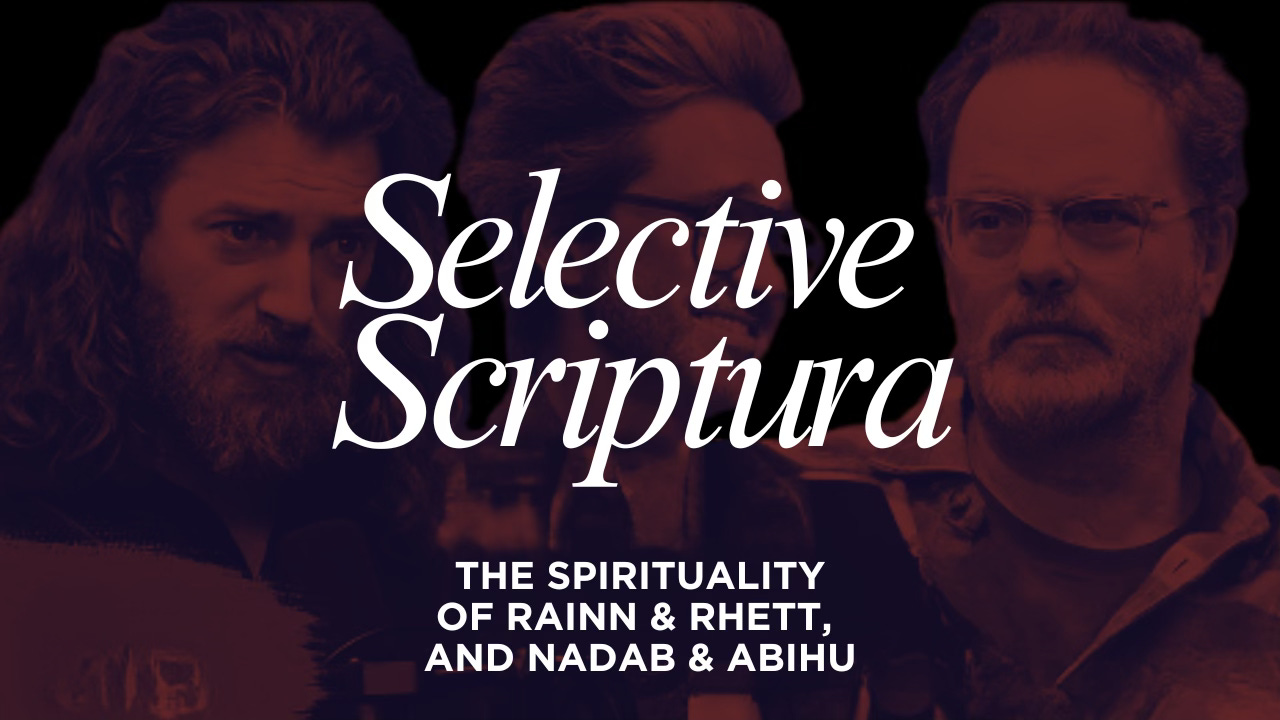
Selective Scriptura: The DIY Spirituality of Rainn & Rhett, and Nadab & Abihu
And the Need for a Biblical Spirituality
My doctoral work at The Southern Baptist Theological Seminary is in biblical spirituality. Biblical. That’s a crucial distinction.
There’s a lot of spirituality talk in the world today, both in and outside of Christianity. Popularity of a subject often requires more clarity. We truly need a biblical spirituality.
I was struck again by this need when I saw a clip of Rainn Wilson with Rhett & Link.1 If you aren’t familiar with Rhett & Link, they are popular YouTubers who formerly worked for Campus Crusade for Christ2 and have now deconstructed and abandoned biblical Christianity.3
Selective Spirituality Isn’t Christian
In the above clip, Rainn calls himself a Christian, while also referring to his Bahá’í faith, which is a faith akin to a religious buffet of Universalism.4 If you listen to the clip, Rainn says he likes the teachings of Jesus, but that’s it. He advocates for the ol’ “red-letter Christianity”—ascribing to (some of) the teachings of Jesus and not his work, and certainly not the teachings of Paul, or the Old Testament.5 Rhett and Link feel the same as Rainn, but they don’t call themselves Christians anymore. At the start of the video they deny the “Christian” label Rainn tries to give them. Rain was surprised. But later, in response to Rainn, Rhett calls himself a Christian even while dismissing the divinity of Christ and his substitutionary death.
The whole video is heavy and saddening.6 And instructive.
None of it is Christian spirituality. It’s an intuitional, do-it-yourself spirituality.
They adapted Christianity to their liking; which is no longer Christianity. They have rejected core doctrines of Christianity. If they really leaned in and heard Jesus’s teachings, they would be confronted by him. They wouldn’t be comfortable with saying, “I love what he taught.”
C. S. Lewis said that people who like the teachings of Jesus but reject him, are actually ignorant of what Jesus taught.7 Remember Lewis’s famous words on this point:
If you had gone to Buddha and asked him ‘Are you the son of Bramah?’ he would have said, ‘My son, you are still in the vale of illusion.’ If you had gone to Socrates and asked, ‘Are you Zeus?’ he would have laughed at you. If you had gone to Mohammed and asked, ‘Are you Allah?’ he would first have rent his clothes and then cut your head off. If you had asked Confucius, ‘Are you Heaven?’, I think he would have probably replied, ‘Remarks which are not in accordance with nature are in bad taste.’ The idea of a great moral teacher saying what Christ said is out of the question. In my opinion, the only person who can say that sort of thing is either God or a complete lunatic suffering from that form of delusion which undermines the whole mind of man.8
Moments like this from Rainn, Rhett, and Link reveal while we need a biblical spirituality. Not just a red-letter spirituality, but a whole-Bible spirituality. Unless the whole Bible is red.
Whole Bible Spirituality
Genesis to Revelation is a unified testimony of what it means to know and communion with God. The whole Bible shows us how God is to be known, loved, and followed—glorified and enjoyed. The whole Bible shows us God’s grace for us weary sinners.
We are not to add or takeaway from the Scriptures (Dt 12:32; Rev 22:18).
We are not to go beyond what is written (1 Cor 4:6).
We live on every word of God’s word (Matt 4:4).
We are formed by all of the God-breathed Scripture (2 Tim 3:16).
A biblical spirituality is Bible-fed, Bible-formed, Bible-guided, Bible-bound. It is the spiritual outworking of sola scriptura. We don’t need to edit Christianity.
Any DIY ideas for how to commune with God, like Nadab and Abihu in Leviticus 10, are ill advised. They brought an “unauthorized” and “not commanded” spirituality to God. And the results were deadly. Literally.
1 Now Nadab and Abihu, the sons of Aaron, each took his censer and put fire in it and laid incense on it and offered unauthorized fire before the Lord, which he had not commanded them. 2 And fire came out from before the Lord and consumed them, and they died before the Lord. 3 Then Moses said to Aaron, “This is what the Lord has said: ‘Among those who are near me I will be sanctified, and before all the people I will be glorified.’ ” And Aaron held his peace. (Leviticus 10:1–3)
We don’t need to import practices, disciplines, and ways of formation that are foreign to the Scriptures. The biblical spiritual disciplines, for those who are abiding in Christ, are God’s blessing to us. We don’t need the melons over in Egypt.
Israel was warned to not import the spirituality of those around them:
Do not inquire about their gods, saying, ‘How did these nations serve their gods?—that I also may do the same.’ You shall not worship the Lord your God in that way, for every abominable thing that the Lord hates they have done for their gods, for they even burn their sons and their daughters in the fire to their gods. (Deuteronomy 12:30–31)
We must stand guard against syncretism. We must not look to the right or the left, peaking over the fence to see how our neighbors engage their gods. While some Buddhists have found labyrinths helpful for meditation, that does not mean that Christians should. Walking and praying is great, but you don’t need a maze.9 We need the biblical spiritual practices. The Scripture gives us the God-ordained, God-sanctioned, God-blessed ways of growing us in godliness (1 Timothy 4:7).
We need a sola scriptura for our spiritual formation. Anything less, or more, is a strange fire.
Jesus says, "Have you not read....?" about: the Law (Gen, Ex, Num), the Prophets (Isa), the Writings (1 Sam), and the Psalms. A biblical spirituality is a whole Bible spirituality. Read it all. Know it all. Love it all. Integrate it all.
There’s a little language at the beginning of the clip. I started it at the relevant point, 4:50.
https://shelbyabbott.com/2020/02/26/red-flags-spiritual-deconstruction-old-friends-rhett-link/
https://www.thegospelcoalition.org/article/rhett-link-deconversion/
https://www.christianitytoday.com/2023/07/rainn-wilson-soul-boom-spiritual-revolution/ and https://www.bahai.org/beliefs
It’s always striking how people ignore the “red-letters”where Jesus says he is the eternal God and the only way of salvation (John 8:58; 14:6). And it’s funny how people like Rainn will “trust” the red-letters/words Christ spoke, which were written down by guys who wrote the rest of the surrounding text!
On their own YouTube channel, they have posted an update on the deconstruction. This one is more aggressive and antagonistic (and more language) than the clip with Rainn Wilson. As I listened to this episode, it was obvious there is a lot of pain and disappointment in both of them. There’s also a lot of contradictions. Link expresses frustration over people who are certain in matters of religion. And then, later in the show, Link says he is sure Hell isn’t real. Even later, Link mentions how he prayed for his wife. I’ve heard Rhett call himself a “hopeful agnostic,” a theist, and a “Christian.” I take this to mean that he is still searching, and I hope Luke 15 plays out in his life.
“The majority of them start with the idea of the ‘great human teacher’ who was deified by His superstitious followers. It must be pointed out how very improbable this is among Jews and how different to anything that happened with Plato, Confucius, Buddha, Mohammed. The Lord’s own words and claims (of which many are quite ignorant) must be forced home. C. S. Lewis, God in the Dock, ed. Walter Hooper (HarperOne, 1994), 101.
C. S. Lewis, God in the Dock, ed. Walter Hooper (HarperOne, 1994), 168.
I wish I were making this up.













Well done. This is such a critical perspective right now.
“We don’t need to import practices, disciplines, and ways of formation that are foreign to the Scriptures.” This is an unwise assessment. Human beings have a nervous system, a body, awareness, and attention. Learning tools and developing skills that support the wise use of these human faculties and functions aid in the development of character and the formation of love, joy, peace, patience, kindness, goodness, faithfulness, gentleness, and self-control.